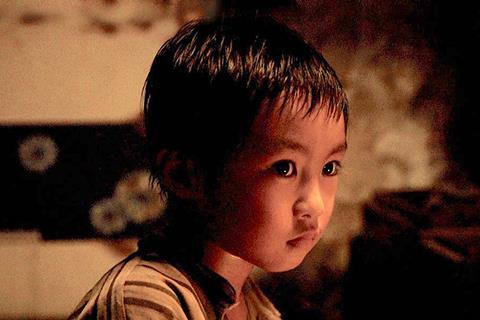In the devastating aftermath of the Second World War, survivors face a hard-scrabble existence

Dir/scr/cin/ed: Shinya Tsukamoto. Japan. 2023. 95mins
In the devastating aftermath of the Second World War, a few broken lives intersect on the edge of a black market in a Japanese town that has largely been reduced to scorched earth and rubble. The latest from Shinya Tsukamoto is a bruising and timely reminder that war is not just about geopolitical muscle flexing, it is about ordinary people piecing back together the shattered fragments of minds and bodies, about a society that has crumbled to a kind of savage subsistence. It is not an easy watch, but, driven by performances that range from haunting and affecting, to terrifying and grotesque, it is a powerful one.
This is a film that shows humanity to be a skin that is all too easily shed
There’s an obvious kinship here with Tsukamoto’s most recent films, Fires On The Plain (2014), which told of a Japanese soldier clinging to life at the end of the Second World War in the Philippines, and Killing (2018), which looked at the legacy of the Samurai. Both of these pictures premiered in Competition in Venice, where Shadow Of Fire also bowed; this time in Horizons, where it picked up the NETPAC Award. The film screens in Tokyo, following a berth in Toronto, and will subsequently have a slot in the Taipei Golden Horse Film Festival before getting a domestic release in November. Further festival showings are likely for this bleak but striking indictment of the human cost of war and, while it would present something of a challenge for distributors, the film could find a home with a bespoke streaming platform.
Harrowing though it is, however, the film does warrant a big screen viewing where at all possible. The smudged, smoky light in the first section of the picture, which unfolds in the charred husk of the inn where a traumatised young woman (Shuri) sells glasses of sake – and herself – has a bleak beauty. A young soldier (Hiroki Kono) – a teacher before he was called up, and still carrying a second-grade algebra book as a connection to the man he was – finds a moment of peace with the woman. Although he does not have money to pay her for her company, for a while the pair, together with a wily orphan (Tsukao Ogo), who lives by his wits and skill as a thief, form a de facto family unit.
But the film’s use of sound – foregrounded to the point of being obtrusive at times – and a discordant, tortured score leaves us with no doubt that this moment of domestic tranquillity is a fragile one. The calls of crows scar the sullen silence; cicadas add to the sense of oppressive heat. But it is the occasional crack of gunfire that causes the soldier to cower in terror, opening the door to his barely suppressed memories.
The domesticity is, like everything in the shadow of the war, short-lived and ultimately doomed. The orphan joins with a traveller (Mirai Moriyama) who has offered him money in exchange for the use of the gun that the child carries with him; one he needs to settle old scores. The mounting sense of uncertainty and threat within this arrangement is seeded by the expressive physicality of Moriyama’s performance. A dancer as well as an actor, he brings to the character an almost demonic quality at times, while at others he just seems like another damaged survivor.
Definitely at the feel-bad end of the spectrum, this is a film that shows humanity to be a skin that is all too easily shed, to reveal the desperate animal beneath.
Production companies: Kaijyu Theatre Co. Ltd.
International Sales: Nikkatsu Corporation international@nikkatsu.co.jp
Producer: Shinya Tsukamoto
Cinematography: Shinya Tsukamoto
Editing: Shinya Tsukamoto
Production design: Yoshiaki Nakajima, MASAKO
Music: Chu Ishikawa
Main cast: Shuri, Mirai Moriyama, Tsukao Oga, Hiroki Kono







![The Brightest SunScreen[Courtesy HKIFF]](https://d1nslcd7m2225b.cloudfront.net/Pictures/274x183/3/5/0/1448350_thebrightestsunscreencourtesyhkiff_312678.jpg)














![The Brightest SunScreen[Courtesy HKIFF]](https://d1nslcd7m2225b.cloudfront.net/Pictures/100x67/3/5/0/1448350_thebrightestsunscreencourtesyhkiff_312678.jpg)
